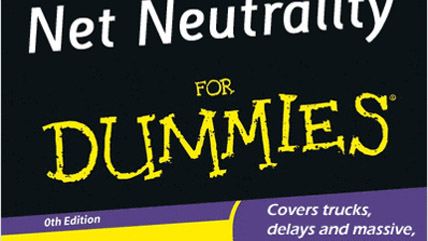Net Neutrality Isn't Dead Yet
The court decision is disastrous, but not because it struck down the net neutrality rules.

Judging by the headlines over the past week, one would think that the Federal Communications Commission (FCC) was dealt a crushing blow when the DC Circuit Court of Appeals struck down the agency's net neutrality rules.
Under the headline "Net neutrality is dead. Bow to Comcast and Verizon, your overlords," Los Angeles Times business columnist Michael Hiltzik reported that the ruling "was worse than the most dire forecasts" and "thoroughly eviscerated" the FCC. At Slate, longtime net neutrality advocate Marvin Ammori wrote that "the court loss was even more emphatic and disastrous than anyone expected."
The reality is that the court decision is disastrous, but not because it struck down the net neutrality rules.
The suit by Verizon challenging the 2010 rules was ultimately a challenge of the FCC's statutory authority to regulate the Internet. It had been an open question how far the FCC could go. The ruling answered that question, as Ammori would say, emphatically. While the court found that the Commission could not issue net neutrality rules the way it did, thus striking them down, it nevertheless made it clear that Congress gave the FCC (and also state public utility commissions) broad powers to regulate in the name of encouraging broadband deployment.
That means that the FCC can reintroduce net neutrality rules as long as they make a colorable argument that they "encourage the deployment … of advanced telecommunications services," as the Telecommunications Act reads. In fact, under the ruling there's little the FCC and state commissions can't do as long as it is meant to "encourage deployment." This includes setting rates not just for broadband, but also potentially for services offered over broadband, such as video services like Netflix.
The FCC might even have the authority now to require blocking of sites suspected of hosting pirated content, just as the rightly defeated Stop Online Piracy Act would have done. After all, a case could be made that piracy affects the viability of music services like iTunes or Pandora, and the health of those services contributes to the demand for broadband, which the FCC is now empowered to "encourage" with any "regulating methods that remove barriers to infrastructure investment."
The Wall Street Journal's Tom Gara captured the real meaning of the decision best by quoting Obi-Wan Kenobi telling Darth Vader, "If you strike me down, I shall become more powerful than you can possibly imagine." And yet, even though their putative Jedi champion, the FCC, has grown more powerful, proponents of net neutrality should also be worried.
In a prophetic 2009 article, written at time that the net neutrality rules were first being proposed, Corynne McSherry wrote for the pro-neutrality Electronic Frontier Foundation that proponents should be careful of what they wished. "'Net neutrality' might very well come to be remembered as the Trojan Horse that allowed the FCC take over the Internet," she warned, noting that if the FCC was allowed to claim broad authority "for net neutrality regulations (something we might like) today, it could just as easily be invoked tomorrow for any other Internet regulation that the FCC dreams up (including things we won't like)." For example, it wouldn't be difficult to imagine a future FCC using new broad powers to regulate for "decency" online the way it does in broadcasting, she wrote.
In his first statement after the ruling, FCC Chairman Tom Wheeler felt compelled to reassure us that the Commission will be judicious with its new powers.
"The government, in the form of the FCC, is not going to take over the Internet," he said. "It is not going to dictate the architecture of the Internet. It is not going to do anything that gratuitously interferes with the organic evolution of the Internet in response to developments in technology, business models, and consumer behavior." But he also stressed that the FCC "is not going to abandon its responsibility to oversee that broadband networks operate in the public interest."
That raises the question, what exactly is in the public interest? It's whatever a majority of FCC commissioners think is in the public interest. And that should worry anyone who cares about an open Internet where entrepreneurs can innovate without first seeking permission from government.


Show Comments (36)